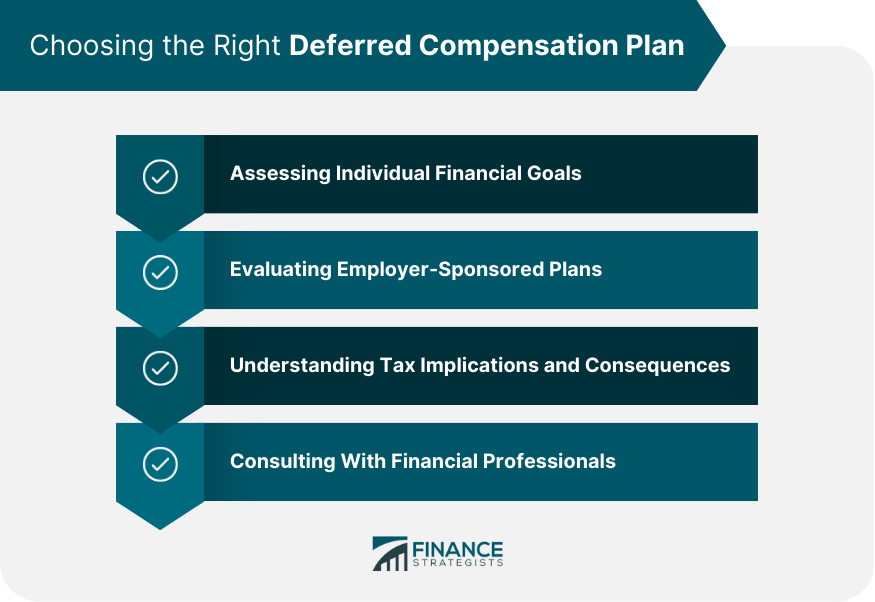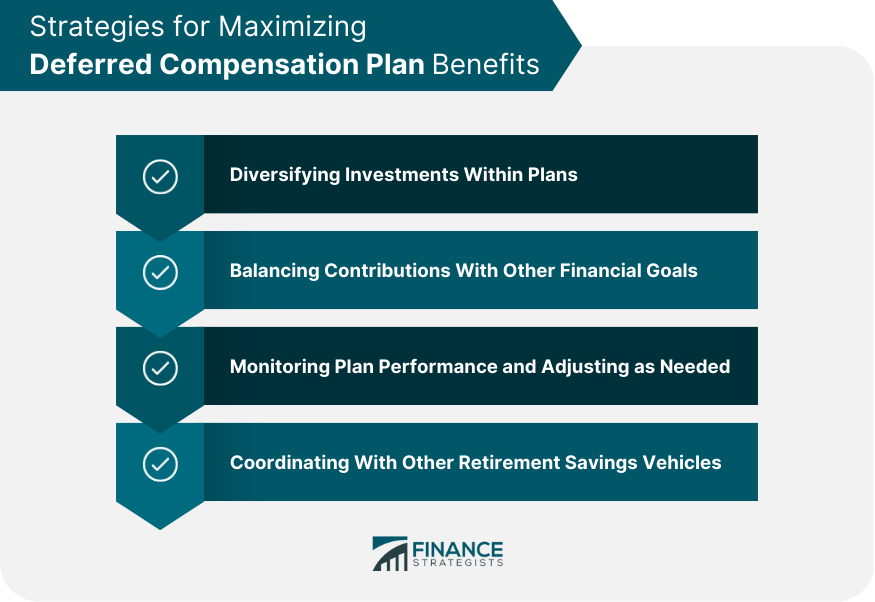Deferred compensation plans are voluntary arrangements between employees and employers that allow employees to defer a portion of their income to be paid at a later date, typically after retirement. These plans can provide tax advantages and supplement other retirement savings vehicles. The primary purpose of deferred compensation plans is to help employees save for retirement by setting aside a portion of their income on a tax-deferred basis. Benefits of these plans include potential tax savings, increased retirement income, and financial planning flexibility. There are two main types of deferred compensation plans: nonqualified deferred compensation (NQDC) plans and qualified deferred compensation plans. Each type has its own features, advantages, and tax implications. NQDC plans are typically offered to highly compensated employees and key executives. Participation is usually determined by the employer and may be based on factors such as job title, salary, or length of service. NQDC plans allow participants to defer a portion of their income without being subject to the contribution limits and nondiscrimination rules that apply to qualified plans. This provides greater flexibility in terms of contribution amounts and plan design. Elective deferral plans allow employees to voluntarily defer a portion of their salary, bonuses, or other compensation. The deferred amounts are usually invested on the employee's behalf and grow tax-deferred until distribution. SERPs are employer-sponsored plans that provide supplemental retirement benefits to select employees. Employers typically contribute to these plans on behalf of the employee, and the benefits are often based on a percentage of the employee's salary. Deferred amounts in an NQDC plan are not subject to income tax until they are distributed to the employee. Distributions are generally taxed as ordinary income at the employee's current tax rate at the time of distribution. NQDC plan contributions and earnings are subject to Social Security and Medicare taxes at the time the compensation is deferred, not when the amounts are distributed. Qualified deferred compensation plans are subject to specific rules and regulations under the Employee Retirement Income Security Act (ERISA) and the Internal Revenue Code. These plans are typically available to a broader range of employees, and participation is often voluntary. Qualified plans offer tax advantages, such as tax-deferred growth and the possibility of tax-deductible contributions. Additionally, these plans are subject to contribution limits and nondiscrimination rules, ensuring that benefits are provided equitably to all eligible employees. 401(k) plans are employer-sponsored retirement savings plans that allow employees to contribute a portion of their salary on a pre-tax or after-tax basis. Employers may also provide matching contributions. 403(b) plans are similar to 401(k) plans but are designed for employees of tax-exempt organizations, such as schools and nonprofit organizations. 457(b) plans are deferred compensation plans for employees of state and local governments and certain tax-exempt organizations. These plans allow participants to defer a portion of their salary and enjoy tax-deferred growth on their investments. Contributions to qualified plans are generally tax-deductible, and investment earnings grow tax-deferred until distributed. Distributions are typically taxed as ordinary income at the employee's current tax rate at the time of distribution. Contributions to qualified plans are subject to Social Security taxes and Medicare taxes at the time the compensation is deferred. However, investment earnings within the plan are not subject to these taxes. When selecting a deferred compensation plan, it's essential to consider your financial goals, desired retirement age, and overall retirement savings strategy. Review the features, advantages, and tax implications of any employer-sponsored deferred compensation plans available to you. Compare these plans to other retirement savings vehicles to determine which option best aligns with your financial goals. Consider the tax implications of each deferred compensation plan, including income tax, Social Security, and Medicare tax treatment. Consult with a tax professional to determine the most tax-efficient strategy for your specific situation. Seek the advice of a financial advisor or retirement planning professional to help you choose the most appropriate deferred compensation plan and develop a comprehensive retirement savings strategy. For NQDC plans, it's crucial to consider the financial stability of your employer, as these plans are not protected by ERISA or insured by the Pension Benefit Guaranty Corporation (PBGC). If your employer experiences financial difficulties, your deferred compensation may be at risk. Both qualified and nonqualified deferred compensation plans may involve investment risk. It's essential to understand and manage the investments within your plan to minimize potential losses and maximize growth potential. Tax laws are subject to change, which could impact the tax treatment of deferred compensation plans. Staying informed about potential changes can help you adjust your strategy and maintain the most tax-efficient approach. Deferred compensation plans generally have strict rules regarding access to funds before retirement, often imposing penalties or taxes for early withdrawals. Be aware of these limitations when planning your overall financial strategy. To minimize investment risk and optimize potential returns, diversify your investments within your deferred compensation plan. This may involve investing in a mix of asset classes, such as stocks, bonds, and real estate. While maximizing contributions to deferred compensation plans can provide tax advantages and boost retirement savings, it's essential to balance these contributions with other financial goals, such as saving for a home, funding education, or paying off debt. Regularly review and evaluate the performance of your deferred compensation plan investments. Make adjustments as needed to ensure your plan remains aligned with your financial goals and risk tolerance. Consider coordinating your deferred compensation plan contributions with other retirement savings vehicles, such as individual retirement accounts (IRAs) or employer-sponsored pension plans. This integrated approach can help you optimize your retirement savings strategy. Deferred compensation plans offer valuable benefits, such as tax advantages, increased retirement income, and financial planning flexibility. Both nonqualified and qualified deferred compensation plans can play a crucial role in a comprehensive retirement savings strategy. To make the most of your deferred compensation plan, it's essential to understand the plan's features, advantages, and tax implications. Regularly monitor and manage your plan to ensure it remains aligned with your financial goals and risk tolerance. Consulting with financial professionals, such as financial advisors or tax experts, can provide valuable guidance in selecting and managing your deferred compensation plan. These professionals can help you develop a comprehensive retirement savings strategy tailored to your unique financial goals and circumstances. By understanding and actively managing your deferred compensation plan, you can maximize its benefits and enjoy a more secure and comfortable retirement.What Are Deferred Compensation Plans?
Nonqualified Deferred Compensation (NQDC) Plans
Overview of NQDC Plans
Eligibility and Participation
Key Features and Advantages
Types of NQDC Plans
Elective Deferral Plans
Supplemental Executive Retirement Plans (SERPs)
Tax Implications of NQDC Plans
Income Tax Treatment
Social Security and Medicare Tax Treatment
Qualified Deferred Compensation Plans
Overview of Qualified Plans
Eligibility and Participation
Key Features and Advantages
Types of Qualified Plans
401(k) Plans
403(b) Plans
457(b) Plans
Tax Implications of Qualified Plans
Income Tax Treatment
Social Security and Medicare Tax Treatment
Choosing the Right Deferred Compensation Plan
Assessing Individual Financial Goals
Evaluating Employer-Sponsored Plans
Understanding Tax Implications and Consequences
Consulting With Financial Professionals

Risks and Considerations of Deferred Compensation Plans
Company Financial Stability
Investment Risk
Tax Law Changes
Limited Access to Funds
Strategies for Maximizing Deferred Compensation Plan Benefits
Diversifying Investments Within Plans
Balancing Contributions With Other Financial Goals
Monitoring Plan Performance and Adjusting as Needed
Coordinating With Other Retirement Savings Vehicles

Conclusion
Deferred Compensation Plans FAQs
A deferred compensation plan is a type of retirement plan that allows participants to defer a portion of their compensation until a later date, typically retirement. The funds are invested and grow tax-deferred until they are distributed to the participant.
Deferred compensation plans differ from traditional retirement plans in that they are typically offered to highly compensated employees and allow for greater flexibility in terms of contribution limits and distribution options. Unlike traditional retirement plans, deferred compensation plans are not subject to the same legal and regulatory requirements.
Some potential benefits of participating in a deferred compensation plan include the ability to defer taxes on compensation, flexibility in distribution options, and the potential for higher contributions than traditional retirement plans.
Some potential drawbacks of participating in a deferred compensation plan include the lack of legal protections and regulatory oversight, the potential for the employer to default on payments, and the limited investment options available.
Individuals can determine if a deferred compensation plan is right for them by evaluating their retirement goals, financial situation, and tax obligations, and working with a financial advisor to develop a comprehensive retirement income plan that considers all available options. It is important to carefully evaluate the risks and benefits of any retirement plan before making investment decisions.
True Tamplin is a published author, public speaker, CEO of UpDigital, and founder of Finance Strategists.
True is a Certified Educator in Personal Finance (CEPF®), author of The Handy Financial Ratios Guide, a member of the Society for Advancing Business Editing and Writing, contributes to his financial education site, Finance Strategists, and has spoken to various financial communities such as the CFA Institute, as well as university students like his Alma mater, Biola University, where he received a bachelor of science in business and data analytics.
To learn more about True, visit his personal website or view his author profiles on Amazon, Nasdaq and Forbes.











